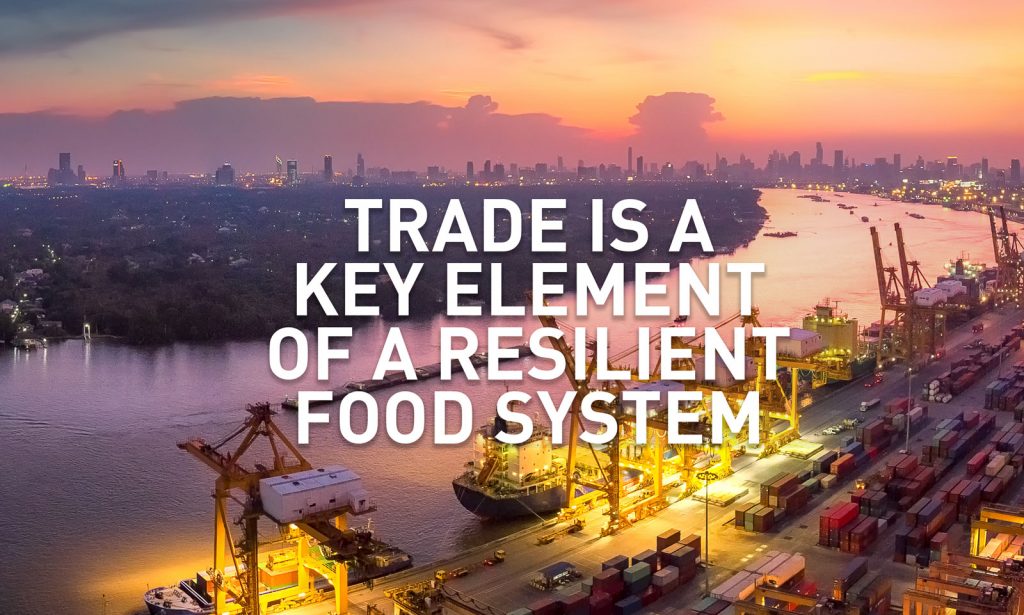Agri-Food Trade Facilitating Global Market Access
Ahead of the EU's Agriculture and Fisheries Council, the agri-food industry eagerly awaits new policies and strategies that will shape the future of farming and fishing in the European Union. With so much at stake, it is crucial for policymakers to consider the diverse perspectives and challenges faced by those working in this sector.

As an industry with a significant impact on both the economy and the environment, agriculture and fisheries require careful attention and forward-thinking solutions. In this post, we will explore various aspects of this sector, including key challenges, potential ideas, and recommendations for policymakers.
What is the Current State of Agriculture and Fisheries in the EU?
The agricultural and fisheries sector in the European Union plays a vital role in providing food security, creating job opportunities, and contributing to the overall economy. However, it also faces numerous challenges, such as climate change, resource depletion, and the need for sustainable practices.
In recent years, the industry has witnessed a shift towards more environmentally-friendly and sustainable farming and fishing methods. This transition is driven by increased awareness of the impact of these activities on biodiversity, water quality, and soil health.
Additionally, consumers are becoming more conscious about the origin and production methods of the food they consume. They expect transparency, sustainable practices, and higher animal welfare standards. Meeting these consumer demands while maintaining economic viability remains a significant challenge for the industry.
Ideas For the Future of Agriculture and Fisheries
To address the challenges in the agriculture and fisheries sector, policymakers should consider several innovative ideas and approaches:
- Investing in research and development of sustainable farming and fishing technologies
- Supporting farmers and fishers in adopting more sustainable practices through incentives and subsidies
- Promoting diversification of agricultural activities to reduce monoculture and enhance biodiversity
- Encouraging collaboration between farmers, fishers, and scientists to develop effective solutions
- Investing in education and training programs to equip future generations with the skills necessary for sustainable agriculture and fisheries
Implementing these ideas will be key to transforming the industry and ensuring its long-term sustainability.
Recommendations For Policymakers
Based on the current challenges and potential solutions, here are some recommendations for policymakers in the EU:
- Develop comprehensive policies that prioritize sustainability and environmental protection
- Allocate sufficient funding for research and innovation in agricultural and fisheries practices
- Facilitate knowledge exchange and collaboration among stakeholders through platforms and networks
- Consider the social and economic consequences of policy decisions on farmers, fishers, and rural communities
- Ensure transparency and traceability in the food supply chain to meet consumer preferences
By carefully considering these recommendations, policymakers can drive positive change and create a more sustainable future for agriculture and fisheries in the European Union.
Listicle of Promising Sustainable Farming and Fishing Practices
1. Aquaponics - This innovative farming technique combines aquaculture (fish farming) with hydroponics (growing plants without soil). It provides a highly efficient and environmentally-friendly way to produce food.
2. Vertical Farming - By utilizing vertical space, this practice maximizes land efficiency, reduces water usage, and allows for year-round production in urban settings.
3. Precision Agriculture - Using advanced technologies like GPS and sensors, farmers can optimize the use of fertilizers, water, and other resources, reducing waste and environmental impact.
4. Sustainable Fishing Methods - Implementing techniques such as selective fishing, reducing bycatch, and establishing protected marine areas helps preserve fish populations and maintain ecological balance.
5. Agroforestry - Combining agriculture with forestry helps increase biodiversity, improve soil quality, and mitigate climate change by sequestering carbon dioxide.
Question & Answer for the Future of Agriculture and Fisheries
Q: How can we ensure the long-term viability of small-scale farmers and fishers?
A: Supporting small-scale farmers and fishers is crucial for maintaining diversity and sustainability in the industry. Policymakers can provide financial assistance, access to markets, and technical support to help them overcome challenges and compete with larger-scale operations. Additionally, fostering local food systems and creating niche markets can create new opportunities for small-scale producers.
Q: What role can technology play in addressing the challenges in agriculture and fisheries?
A: Technology can be a powerful tool in improving resource efficiency, enhancing productivity, and reducing environmental impact. From precision farming technologies to blockchain-based traceability systems for fish, technology can enable more sustainable practices and provide valuable insights for decision-making.
Q: How can we ensure the responsible consumption of fish and seafood?
A: Consumers play a crucial role in driving sustainable practices in the fishing industry. By choosing certified sustainable seafood, avoiding endangered species, and supporting local and small-scale fishers, consumers can make a positive impact. Education campaigns and labeling schemes can empower consumers to make informed choices and encourage responsible consumption.
Summary of the Future of Agriculture and Fisheries in the EU
The future of agriculture and fisheries in the European Union relies on a sustainable and forward-thinking approach. Policymakers, industry stakeholders, and consumers must work together to address challenges, implement innovative practices, and promote responsible consumption.
Investing in research, supporting sustainable farming and fishing methods, and considering the social and economic consequences of policy decisions are essential steps in creating a resilient and prosperous industry. By prioritizing environmental protection, transparency, and collaboration, the EU can lead the way in sustainable agriculture and fisheries.
Together, we can shape a future where agriculture and fisheries thrive, supporting both our communities and the planet.

Post a Comment for "Agri-Food Trade Facilitating Global Market Access"